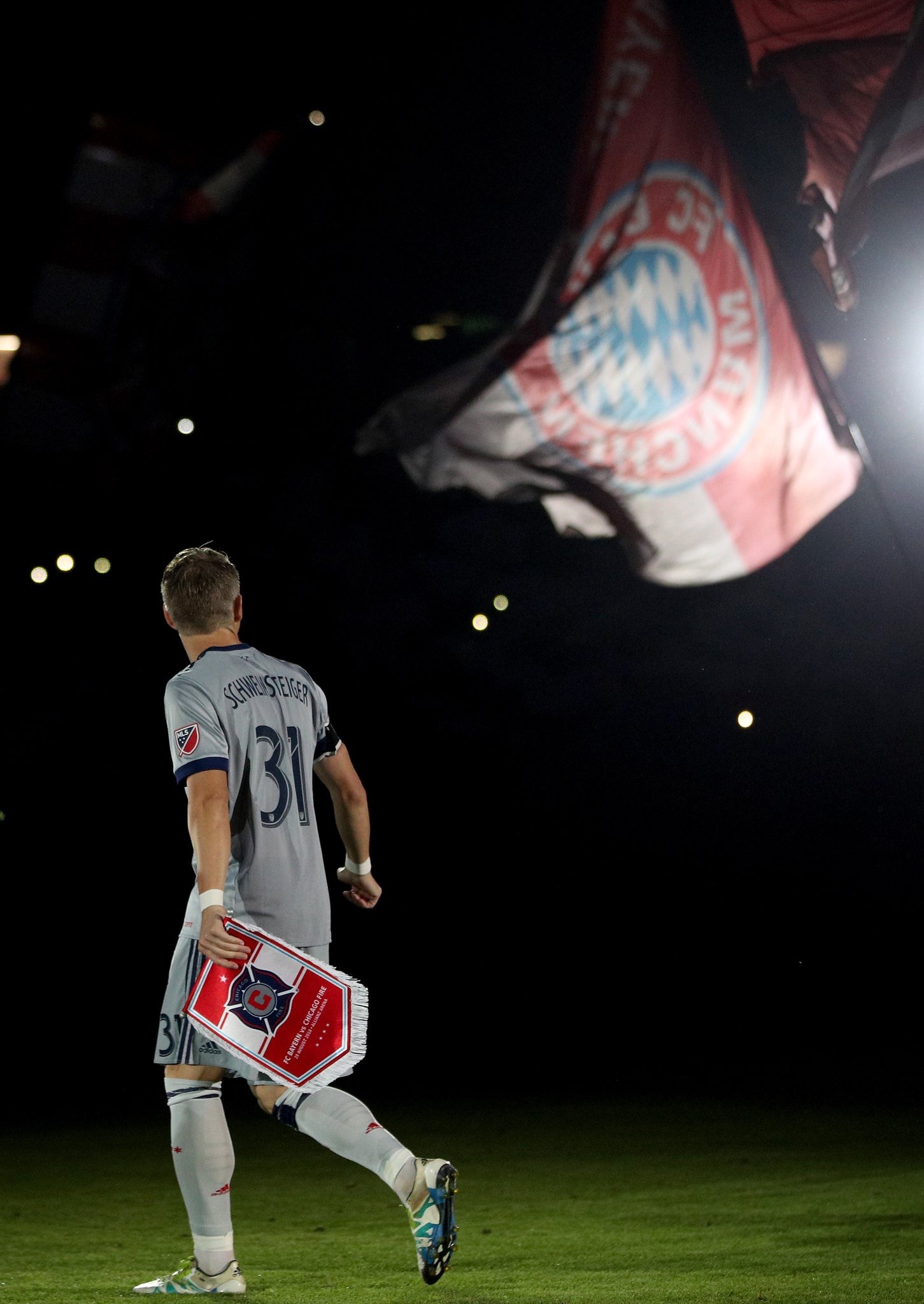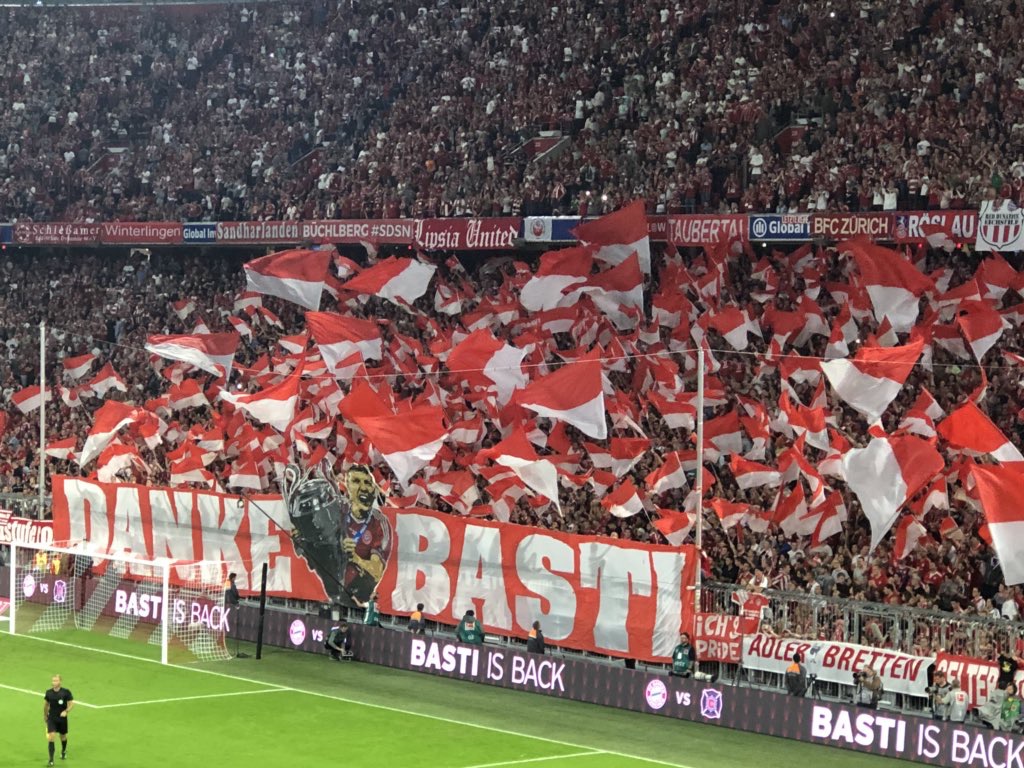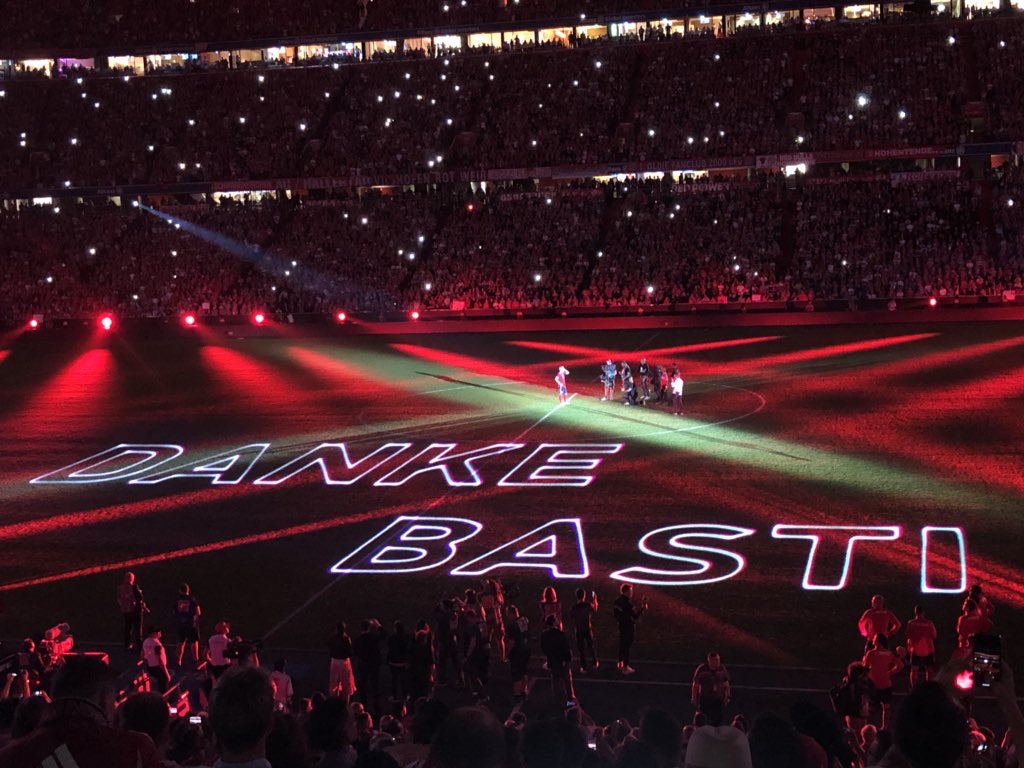Servus Basti
Photo credit: Twitter @brfootball
I still remember the exact moment, more than three years ago, when a Twitter notification popped up on my iPhone screen: a tweet from Bayern Munich, announcing that Bastian Schweinsteiger would leave the club and transfer to Manchester United. It had been a pretty good day for me up to that point; the first book I had ever written was finally up on Amazon for sale – a book about German football and identity, where Schweinsteiger played quite a crucial role, nonetheless – and I was about to proudly send the link to my family and friends and share the good news on Facebook.
The news of Schweinsteiger’s move came as a shock to me and immediately shattered my football world into pieces. Yes, there had been rumors before but I never actually believed that he would really leave the club. Surely not Schweinsteiger, who embodied the “Mia San Mia” spirit of FC Bayern more than anyone else; who had been playing for the club since he was a teenager; who the fans passionately referred to as “Fußballgott” (football god)? And yet, there it was. My bewilderment (no, I refuse to accept this, it can’t be true) turned into anger (how could they just let him go like that, Pep Guardiola and Karl-Heinz Rummenigge, you smug bastards!), and then into sadness (I’ll never see my favorite player sporting the bright red Bayern jersey again!).
Schweinsteiger left without a proper Goodbye to his teammates and fans – his abrupt departure almost hurt more than anything else. To me, FC Bayern without Schweinsteiger wasn’t the same anymore. I’d still watch their Bundesliga games, of course, and cheered them on in the Champions League, but somehow, I always felt like the team’s heart and soul was missing. He’d left and taken my passion and devotion to this club with him.
Photo credit: Twitter @fcbayern
My utter devastation about Schweinsteiger’s decision to leave stems from my affection and fondness for him, dating back to the days when he was still a pimply guy with bleached hair and one half of the fun duo (the other one being Lukas Podolski), which Germans would lovingly refer to as Schweinski. But Schweinski was more than just pranks and jokes. On the pitch, they rang in a new era of German football – one that was promising and refreshing and brought a whiff of excitement into the national team.
I watched him grow from Schweini into Basti and eventually into Schweinsteiger, the emotional leader and relentless engine on the pitch for both Bayern Munich and the German national team. His path wasn’t always easy. Quite the contrary, actually, throughout his career, Schweinsteiger went through many highs and lows. The crushing defeat in the 2012 Champions League final in Munich is one of the first things that come to mind, the image of a broken Schweinsteiger hiding under his jersey after he only hit the post in the decisive penalty shootout; the scorning media reports questioning his abilities of being a true leader when the German national team failed yet again in the semifinals of a major tournament, wondering if the coach should even include him in the squad.
Photo credit: Twitter @FCBayern
Schweinsteiger’s indomitable will to do everything it takes earned him the respect of fans beyond Germany’s borders, while the story of the fallen hero rising again is one that everyone loves and can relate to. We have seen him at his most vulnerable, in his darkest hours, at his lowest points, and we were there to lift him up and rejoice when he overcame all obstacles to fulfill his dreams after all: the Champions League title in 2013, and the World Cup trophy one year later. The World Cup final ultimately cemented his status as a legend: the image of a battered, bruised and bleeding Schweinsteiger pushing forward like a true warrior is permanently imprinted in the memory of every football fan across the globe.
When Schweinsteiger became a world-class player, other clubs called, trying to lure him away from FC Bayern, but he remained steadfast and loyal. Until that fateful day in July 2015. Poof. The man who was the epitome of FC Bayern was suddenly gone. So were my dreams of watching him play in the Allianz Arena just once and shouting out his name when the stadium announcer would say: “Our number 31 – Bastiaaaaaan…” And the crowd would respond enthusiastically: “Schweinsteiger, Fußballgott!” Because I had been living abroad for more than a decade, I never had the chance to do so.
Earlier this year, I found out that FC Bayern was planning a well-deserved and long overdue farewell game for Schweinsteiger. He’d come to Munich with his current club and play one half for Chicago Fire, and the other half for FC Bayern. I didn’t hesitate a single second but immediately went online to buy tickets. Finally, my wish was to become true, and the fans were granted the chance for the closure they were denied three years ago.
Photo credit: Twitter @FCBayern
75,000 people flocked to the Allianz Arena to bid farewell to one of FC Bayern’s most outstanding and popular players. The majority wore jerseys with Schweinsteiger’s number 31; as I was walking from the train station towards the stadium, I was stunned by this extraordinary display of love for one single player.
I knew I’d be emotional, but I didn’t expect to already have watery eyes when Schweinsteiger first set foot on the pitch for the warming-up session. The sheer joy to see him “back home” again was overwhelming; looking left and right, I realized that I wasn’t the only one who felt this way. Of course, there was a lot of pomp and circumstance surrounding Schweinsteiger’s special night, including a display of all the trophies he won with the club and an elaborate lighting show, but at its core, the whole event was created for one purpose only: to pay tribute to this merited player, and to let the fans celebrate him one more time. They did so with ear-deafening chants, cheers, standing ovations and many more tears in their eyes. The game even ended on a very happy note when Schweinsteiger scored a fantastic goal after an assist by his old teammate David Alaba.
After a 4-0 victory for Bayern Munich, Schweinsteiger addressed the crowd, a few tears running down his cheek, and said: “I am one of you, and I will always be one of you” – and we knew that these were not hollow words, but that he truly meant them. Seeing Schweinsteiger making a lap of honor through his beloved stadium and kissing the FC Bayern emblem on his jersey when he came to the “Südkurve” was almost too much to bear; we all enjoyed having him back, but it was a bittersweet moment because it lasted only for so long.
Photo credit: Twitter @FCBayern
Emotions were running high on Tuesday night. For me, it was so gratifying to finally see Schweinsteiger play at home and to shout his name into the evening sky. I can say with absolute certainty that I will never feel the way about another player the way I felt about Schweinsteiger. But it was also more than that: this farewell game came at a time where I am at odds with German football. After the disastrous World Cup, the debate about racism as well as the lack of support for Mesut Özil from so many sides (including FC Bayern, unfortunately), the farewell game for Schweinsteiger reminded me of those years when my football world was still whole. In that sense, it was a double Goodbye: I bid farewell to my favorite player of all time and to the football that I knew and loved for so many years – the two are inseparably linked.
Schweinsteiger’s farewell game had been announced with the tagline “Basti is back.” But then, in the blink of an eye, he was gone again.




